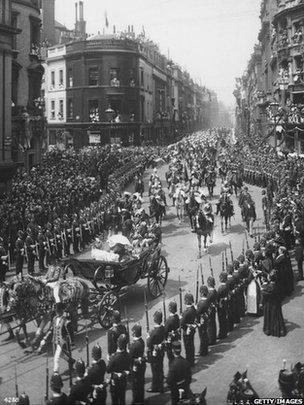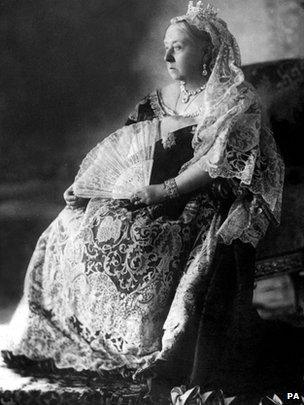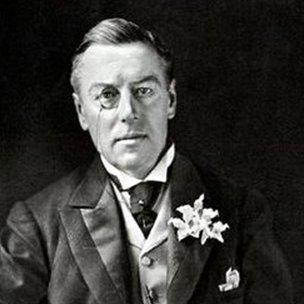Queen Victoria and Britain's first Diamond Jubilee
- Published

The Queen's Jubilee procession was accompanied by a considerable display of imperial might
As the nation prepares to celebrate the 60th anniversary of the accession to the throne of Queen Elizabeth II, we look at the last time we had a Diamond Jubilee - Queen Victoria's in 1897.
While Victoria - like the present Queen - enjoyed her special year at a time when the monarchy was widely held in high esteem, there were profound differences in the way things were done then.
In 1887, Victoria had been feted on her Golden Jubilee with huge nationwide festivities, which included several modern-style royal walkabouts.
The Diamond Jubilee (the first time the term had been used in the context of a 60th anniversary) saw an older, less robust Queen take something of a backseat in the lavish "Festival of the British Empire" proposed by Colonial Secretary Joseph Chamberlain.
Historian Prof Walter Arnstein said the whole idea of staging large public celebrations was still a novel concept to the British public of the day.
"Britons hadn't seen themselves as very good at such things. It was the sort of thing that people in Napoleonic France or Russia had been associated with.
"Queen Victoria herself didn't much care for the idea. She thought it was not altogether appropriate and had to be talked into it.
"She enjoyed it in retrospect, but beforehand had made things quite difficult for [prime minister] Lord Salisbury at the planning stage."
In 1897, it could be argued, the British Empire was at a high watermark. Victoria sat at the head of a realm of 450 million souls, stretched across every continent.
Since 1870, Britain had added Zanzibar, Fiji, Cyprus, Bechuanaland, Somaliland, Kenya, the New Hebrides, Rhodesia and Uganda to its fast-expanding colonies.
General Kitchener was well advanced in his successful campaign to re-establish what in effect amounted to British control of Sudan, and the embarrassing military defeats of the Boer War (1899-1902) had not yet deflated imperial prestige.
However, Britain's economic rivals were biting at her economic heels. The United States had already overtaken Britain in terms of industrial output and Germany was not far behind.
As an industrialist, Joseph Chamberlain promoted the importance of "opening up" the world to British goods. At a time when trade barriers were being put up all over Europe, a peaceful, growing empire seemed the best guarantor of that.
So it was that Tuesday, 22 June - Jubilee Day - came to be celebrated not just throughout Britain but across the globe.
'Deeply touching'
The day was declared a bank holiday in India as well as in Britain and Ireland. Among the many civic works erected, there were memorial fountains in the Seychelles as well as Manchester and municipal clock-towers in Penang, Malaysia, and Christchurch, New Zealand, as well as in Maidenhead and Chester.

Victoria was at the head of an empire that ruled a quarter of the world's population
The highlight of the day itself - a generally bright day in an appalling year for British weather - was a procession along six miles of London streets of the extended Royal Family and the leaders of the self-governing dominions and Indian states.
The British Army and Royal Navy had their best and brightest on show - and the parade was accompanied by colonial forces from Canada, India, Africa and the Antipodes, all in their best dress uniforms.
The diminutive Queen, dressed in her habitual mourning black (as well as Albert, she had lost two children and six grandchildren by 1897) was confined to her state coach by painful arthritis.
Her parade from Buckingham Palace, via Mansion House, past Parliament and then across Westminster Bridge before recrossing the Thames for a service at St Paul's Cathedral, was watched by hundreds of thousands of spectators, huddled beneath bunting and banners - one of which declared Victoria "Queen of earthly Queens".
The 78-year-old monarch recorded: "No-one ever, I believe, has met with such an ovation as was given to me, passing through those six miles of streets... The crowds were quite indescribable and their enthusiasm truly marvellous and deeply touching.
"The cheering was quite deafening and every face seemed to be filled with joy."
Free ale and tobacco
The celebrations had been the subject of tense negotiations between the officials of the Royal Household who said they were anxious to avoid "the expenses incurred to the Privy Purse" of the Golden Jubilee. In the end, the costs were split.

Colonial Secretary Joseph Chamberlain was an enthusiastic imperialist
Prof Arnstein says: "In 1897, Queen Victoria said, in effect: 'If you want a big affair, then get the government to foot the bill.'"
But it wasn't just the high and mighty who celebrated. The spirit of Victorian philanthropy was kept alive and well with street feasts laid on for 400,000 of London's poorest residents and 100,000 of Manchester's. Tea magnate Sir Thomas Lipton sponsored the London event, which included free bottles of ale and pipe tobacco.
The parties went on into the evening, with a chain of beacons lit across Britain; a series of civic festivities in the newly-created Jubilee cities of Nottingham, Bradford and Hull; fireworks displays; and the son et lumiere illumination of St Paul's for the first time. By order of the government, and to much disgust from the Temperance Movement, pubs remained open until 02:30.
It is not recorded whether Victoria - who was known as Drina within royal circles - enjoyed the following day as much, which included a meeting with 10,000 schoolchildren on a rainy Constitution Hill followed by a civic reception in Slough.
All the celebrations were very much focused on the empire, its success, its expansiveness and its seeming invincibility.
Historian and writer Juliet Gardiner says: "The year could be seen as the apogee of British power... once the Boer War started it was clear that we were a bit friendless in Europe."
There were of course dissenters. James Connolly, the Edinburgh-born Irish nationalist, called the Jubilee a "feast of flunkeyism" and wrote: "Join your voice with ours in protesting against the base assumption that we owe to this empire any other debt than that of hatred of all its plundering institutions."
But in mainland Great Britain - and in many of the colonies, such opinions were rare.
Ms Gardiner adds: "Queen Victoria was held in great reverence by the nation. People simply couldn't imagine life without her on the throne.
"Before her reign, the monarchy had been pretty unpopular overall. She could be said to have re-established the people's support for the monarchy."